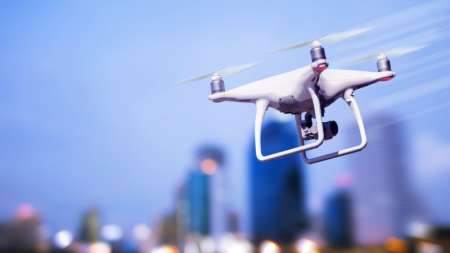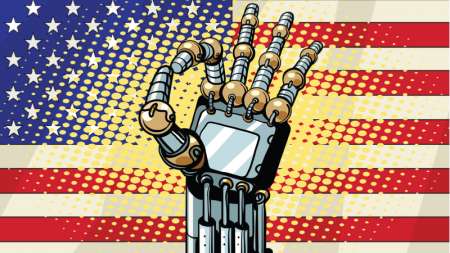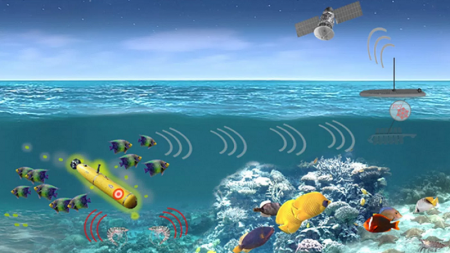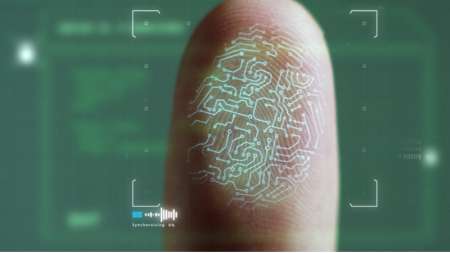The Pentagon’s vision of future warfare involves teams of small autonomous and semi-autonomous unmanned vehicles–in the air, on the ground, and in the water–operating in coordinated swarms to support troops on the battlefield. […]
The $1.3 trillion omnibus spending bill signed by President Trump on Friday gives a sizable boost to the Department of Defense, including a respectable 2.4 percent pay raise for DoD personnel, and for now at least gets Pentagon leaders off the frustrating, and at times wasteful, treadmill of continuing resolutions. And, while the bill doesn’t get into specifics about critical efforts such as cyber operations and artificial intelligence, it does continue programs DoD has underway. […]
The tactics of warfare aren’t what they used to be. In addition to asymmetric battlefield tactics that differ from conventional battles, they also can include cyber, social, economic, and psychological strategies that don’t necessarily involve physical combat or destruction–or even direct human involvement–and can’t be divined by tracking troop movements or fleet deployments. As a result, the signs of impending war aren’t what they used to be either. […]
Artificial intelligence (AI) deployments in the Federal government are already making government smarter, based on examples shared during the second of a three-part series on AI launched last month by the House Subcommittee on Information Technology. Federal agency leaders from the Defense Advanced Research Projects Agency (DARPA), the General Services Administration (GSA), National Science Foundation (NSF), and Department of Homeland Security (DHS) discussed how AI is being implemented to improve the mission of their agencies and what is required to ensure the technology continues to be viewed as a problem solver. […]
Last month the Congressional Subcommittee on Information Technology began a three-part series of hearings to break through the myths and the hype to gain a real understanding of Artificial Intelligence (AI) and the role it can play in the Federal government. […]
Artificial intelligence has been applied to everything from cybersecurity and financial management to human resources and self-driving cars, so it seemed only a matter of time before it could take over video surveillance duties. And while AI, machine learning, and neural networks have made some promising strides in this area, it’s not quite the slam dunk that it might seem. […]
Creating some kind of an Internet of Things (IoT) beneath the ocean would be a daunting task, because the ocean tends to not cooperate. It’s vast, constantly in motion, and filled with water that’s not exactly friendly to communication as we know it. It can be tough to put hardware in place that’s up to the task of tracking activity in the waters around them. As a result, an adversary can often operate “under the radar,” so to speak, moving about underwater without detection. […]
The Department of Defense (DoD) would like to get rid of the Common Access Card (CAC), but the problem–finding a suitable replacement. It turns out that the replacement won’t be one thing, but multiple biometric identifiers that combine to make out a person’s identity. […]
The Department of Defense (DoD) caused a slight disturbance in the Force the other day when it pulled back an announcement related to its cloud computing initiative over some Star Wars-related acronyms. The memo announced the creation of the Central Cloud Computing Program Office, which would go by the acronym C3PO, and would support the Joint Enterprise Defense Infrastructure (JEDI) Cloud, Bloomberg reported. The memo was scrubbed of the Star Wars references and reissued. […]
North Korea’s persistent efforts on nuclear weapons development and some loose talk about red buttons have raised new fears internationally about the possibilities of nuclear conflict. At home, government agencies also are addressing the questions about what to do in the case of a nuclear detonation. The Centers for Disease Control and Prevention (CDC), for example, will hold one of its Public Health Grand Round teaching sessions Jan. 16 on how medical professionals should respond–and although the event has been planned for months, it’s timing suddenly seems to be on the mark. […]
Turning that job over to robotic systems is the idea behind the Defense Advanced Research Projects Agency’s (DARPA) latest competition, the Subterranean Challenge. DARPA is inviting teams from around the world to develop new ways of mapping, navigating, and searching underground environments, and is offering $2.75 million in prize money to the eventual winners. […]
In a data scientist’s dreams, the Internet of Things (IoT) would cover the Earth. And in fact, that dream might not be that far off–ground-based sensors, unmanned vehicles, mobile devices of all kinds, and satellites already combine to offer a pretty clear picture of what’s going on around us, and the resolution is only going to improve. […]
In light of recent advances in performance–not to mention the history of computing–it’s reasonable to assume that artificial intelligence and machine learning systems will become smarter and faster. But government-funded research that is being put into practice at the Air Force Research Laboratory (AFRL) could achieve new levels of performance while also consuming minimal amounts of power. […]
The Defense Department (DoD) is leading the brain-computer interface charge within government, recently investing $65 million across six projects. Each of these projects will work to develop high-resolution neural interfaces and working systems that could help in sensory restoration, specifically in these projects with regard to sight and speech. The contractors–five research organizations and one private company–will work under the Defense Advanced Research Project Agency’s (DARPA) Neural Engineering System Design (NESD) program, which was launched in 2016 with the goal of developing an implantable neural interface able to deliver high-bandwidth data transfers between the brain and electronics systems. […]
The Department of Defense (DoD) is cooking up big plans for blockchain technology, the digital ledger best known for its support of cryptocurrencies such as Bitcoin and Ethereum. The technology’s decentralized, encrypted approach holds promise for a variety of secure functions in addition to financial transactions, from cyber defense and distributed communications to protecting the digital supply chains used by deployed forces for 3D printing. A Navy officer on the Naval Innovation Advisory Council has written that blockchain could “revolutionize” the way military operations over the next decade. […]
A team at the Georgia Institute of Technology, backed by the Defense Department’s research arm, is developing tool that will give cybersecurity investigators that kind of look at a cyber intrusion, quickly providing layers of detail not currently available, in what researchers say is the first instance of automated forensics. […]
Congress wants the Defense Department (DoD) to elaborate on its growing interest is blockchain technology, the secure digital ledger system that can be applied not only to protect financial transactions, but also many other operations such as defending against cyberattacks, protecting logistics supply chains, and securing communications with aircraft and satellites. […]
A military-funded technology that can influence the emotional centers in a person’s brain is ready to receive its first human test subjects. The device, a deep brain stimulator, was created as part of the Department of Defense’s Systems-Based Neurotechnology for Emerging Therapies (SUBNETS) program. […]


















